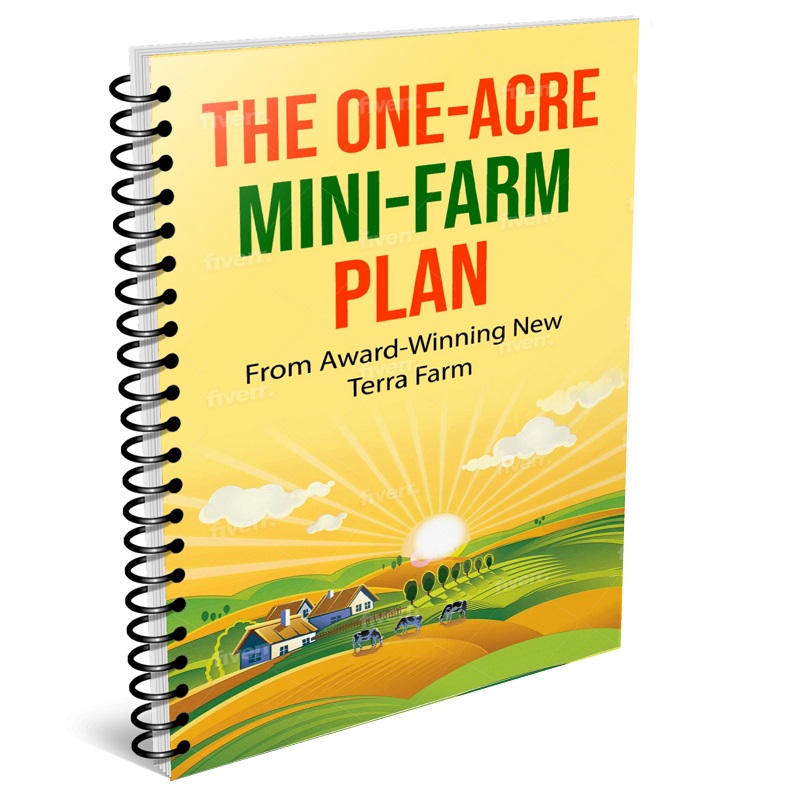Learn how to Farm from this Award-Winning Small Farm in Ontario . . .
You may own a small farm property, or be thinking about moving to the country. If you want to learn how to farm successfully, and make money on your small farm, New Terra Farm Suggestions you follow these 5 steps.
Learn how to Farm Step One:
Get Clear on Your Vision
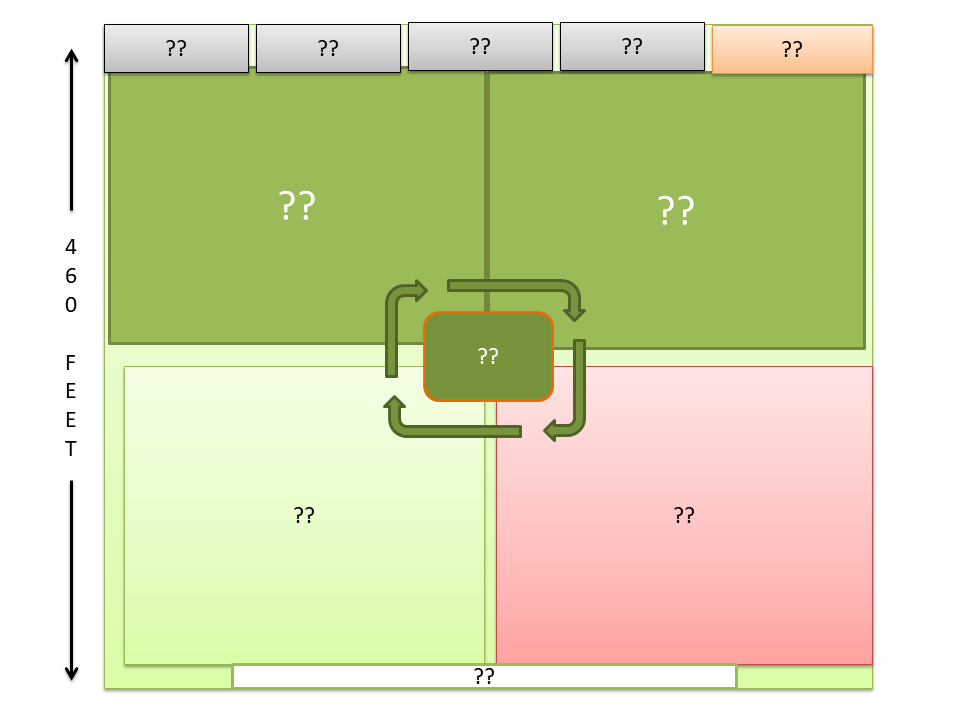 OK, we got this property, now what? OK, we got this property, now what?This might be the most important task you will face when learning how to farm ( or ANY other business for that matter ).
Stephen
Covey in the 'The Seven Habits of Highly Effective People' said 'begin
with the end in mind'; To put
it another way, 'if you don't know where you are going, any road will take your
there'. This
is NOT 'woo-woo' stuff, by the way. In my consulting gigs I've observed
many 'mission and vision' statements as part of organizational business
plans. Many of them were done poorly, in main because of the confusion
between mission and vision.
Here's the difference: 'Mission' is what you do e.g. 'sell organic vegetables to local markets'. 'Vision' is what you want to become; it is literally a picture of your future. A Vision is both an inspiration and a guideline to your desired future.
I do an exercise for my farm coaching clients called Your Ideal Scene. In this exercise, I ask them to imagine five years have
passed since you completed this exercise. You were so fired-up
you went ahead and created your ideal life (because I was JUST THAT GOOD ;-)
You are doing exactly
what you want to do; you have exactly the people in your life you wanted to
attract; you have all the things you really wanted to have, and you have become
the person you always wanted to be.
In short, your life
is just about perfect. Let your imagination go wild, don't hold back, believe
ANYTHING is possible for you to do and be and have. Spend a few minutes
thinking about and picturing that. Got it? Now, describe a
scene
from that ideal life. Make it as vivid and as detailed as you can. Who would
you see, what would you be doing? What's going on around you? What decisions
are you making in this ideal scene? What things or possessions do you see? Who
comes to visit? Where are you physically located? What projects are you
planning? Remember, you can have it all, so dream up the most interesting,
exciting, satisfying scene you can. I
do this exercise regularly for myself, and I can honestly tell you it
motivates me and guides me to set goals and make choices that bring me
closer to my Ideal Scene. Have I achieved it all yet? Nope, but i know which way I'm headed!
Learn how to Farm Step 2:
Set Goals for your Farm
Decide what you expect from your farm both financially and as a lifestyle:
- Is your goal for your small farm to create a part-time second income, or do you expect the farm to support you?
- Do
you plan to do all farm work yourself, with just your family's help, or
do you foresee a need to hire help? Can your farm support you and pay
workers?
- How quickly does
the farm need to produce income? Do you need a cash turnaround right
away, i.e. within the same season your start, or do you have the
resources to wait a couple years for a payback?
- Do you expect to sell your farm someday for a profit, to help your retire?
Note how your goals are influenced by your Vision i.e. Your Ideal Scene.
Learn how to Farm Step Three:
Decide your Principles of Operation
Principles of operation are the basic guidelines as to how you will operate your farm. Here are some questions to help you decide how you will operate. Answering
these questions will help you narrow down your choices for operating
your farm, and therefore determine the farming topics you need to learn. - Will you be growing a commodity like grain, which is generally sold
to processors, or will you be growing something to sell directly to your
end customer, for example vegetables from a market garden?
- Will you operate a conventional farm, or will you grow organically, using sustainable farming techniques?
- Do you plan on a 'mono-culture' i.e. growing predominately one crop, or a poly-culture, growing a variety of crops?
You are probably seeing by now that developing a Vision, goals and principles of operation is an iterative exercise. It's normal to work back and forth a number of times to get a product you are happy with.
Learn how to Farm Step Four:
Assess your capabilities and resources
You
need to take stock of your skills, your capacity and your resources to
operate a small farm. Understand that many farming operations require a
lot of skill or a lot of money (or both) to get started.
Ruling out some things will tell you what you don't need to learn how to farm. Here are some realities for you to consider:
- Grain farming takes hundreds or even thousands of acres of land, and
hundreds of thousands of dollars worth of equipment to do successfully.
- Conventional dairy farming requires an investment in barns,
milking equipment, bulk tanks, and of course your milking herd. It's
estimated that the start-up cost for a new dairy operation is about $1.8
million.
- Stocker cattle or cow-calf operations require large
grazing areas, unless you use feed lots. Then you require an expensive
investment in manure handling equipment and a manure lagoon to hold the
waste.
Each
of these operations is also knowledge-intensive, requiring several
years experience to learn how to farm them proficiently. So make a
realistic assessment of your capabilities and experience before deciding
on your farming model.
Learn how to
Farm Step Five:
Determine which farming model fits with your Vision,
your goals, your principles, and your resources.
Given all the above, you may be wondering if there is anything you can learn how to farm with limited resources.
Here are a few suggestions based on lowest start-up cost and quickest payback.Start a market garden based on CSA principles: This does not require a lot of money, or equipment, or land. As little as 1/8 of an acre ( 5,000 square feet ) can produce a lot of vegetables.
Equipment can be drilled or rented, so the start-up cost can be very low. And you get paid the same season you start. You should have, or plan to acquire, some experience as a gardener.
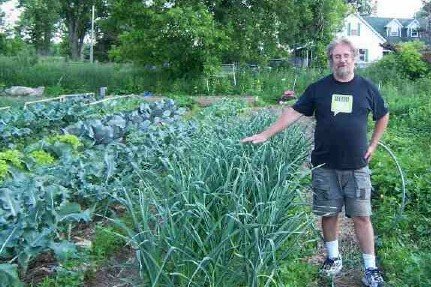 Our CSA market garden made us money from Day 1 Our CSA market garden made us money from Day 1Raise chickens for meat. If you raise meat chickens in the warm
months only, on pasture, the start-up cost and the equipment
requirements are very low. You can make a profit in 10-12 weeks if you control your bird unloads.
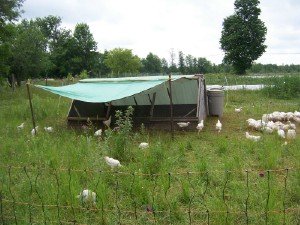 We raise our meat birds on pasture using portable shelters and electric mesh fencing for protection We raise our meat birds on pasture using portable shelters and electric mesh fencing for protection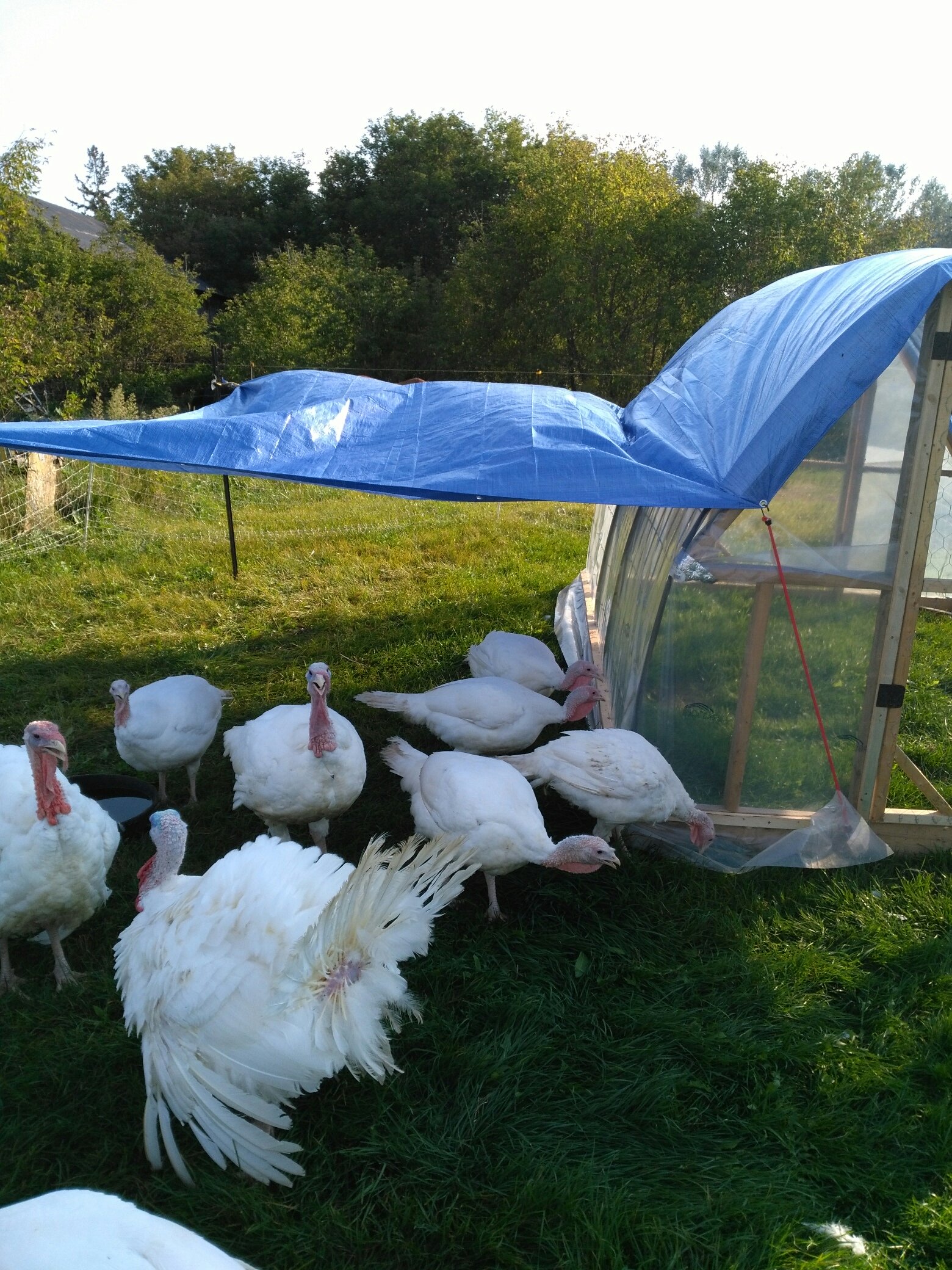 Organic pasture-raised turkey is also a popular and profitable enterprise Organic pasture-raised turkey is also a popular and profitable enterpriseRaise freezer pork. Raising a few pigs on pasture is very
different from the large 'hog barns' you may have seen. Pigs on pasture
are healthier and cleaner than barn-raised animals.
And once your customers taste your premium organic pasture-raised pork, they will keep coming back for more.
As with meat chickens and turkeys, if you raise them in the warm months only, the start-up requirements are very low.
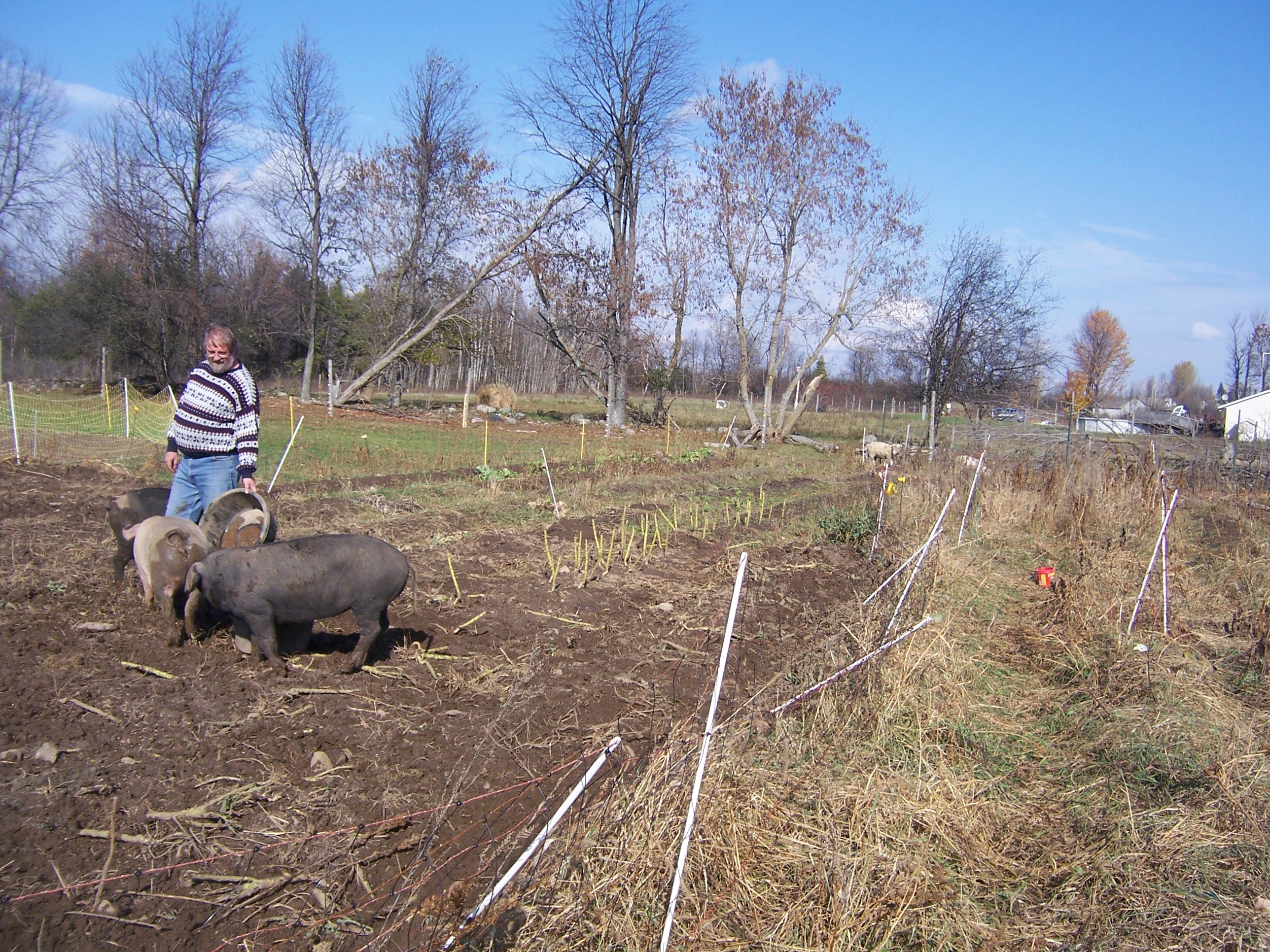 Our premium piggies also help clean up our garden in the fall Our premium piggies also help clean up our garden in the fall
Bonus Step: Get started now!
Whichever enterprise you start with, the best way to learn how to farm is by actually doing it. Get some basic information, buy a couple books, talk to some other farmers already doing what you want to do.
Then get started, just perhaps by growing food for your family and a few friends. Growing a small farm is the best job I ever had; Don't wait to learn how to farm on your own small property!
Free Farm Plan
Get my FREE One-Acre Farm Plan and learn how to raise pigs, chickens and more, integrated with an organic market garden, to
make more money from your small property.
Imagine building a profitable and sustainable mini-farm even on a small piece of land.
Enter your best email and the Free Farm Report will be sent to you right away.
More Resources for the Small Grower and Homesteader
Chapter 9 - Seven Cash Cow Crops: The Self-Sufficient Backyard Raise chickens, pigs and a productive organic garden: The Homesteader Book Bundle Fresh egg for breakfast (and maybe barter): The Eggs Factory If you need to build it on your homestead, the plans are here: 16,000 Woodworking Plans
More like Learn How to Farm
Check out the best crops for small farm profit top 10 list to maximize earnings, from microgreens to gourmet mushrooms.
Learn first, earn second. How to learn about farming before you take the big leap into growing crops for money/
Learn how to buy a farm the smart way — without debt, regret, or overwhelm. Discover the steps to find, fund, and thrive on your first piece of land
We use a lot of floating row cover for both insect and frost protection. Here's how we do it
An imaginary conversation with Joel Salatin, Eliot Coleman, and Jean-Martin Fortier discussing the attributes of a successful small farmer
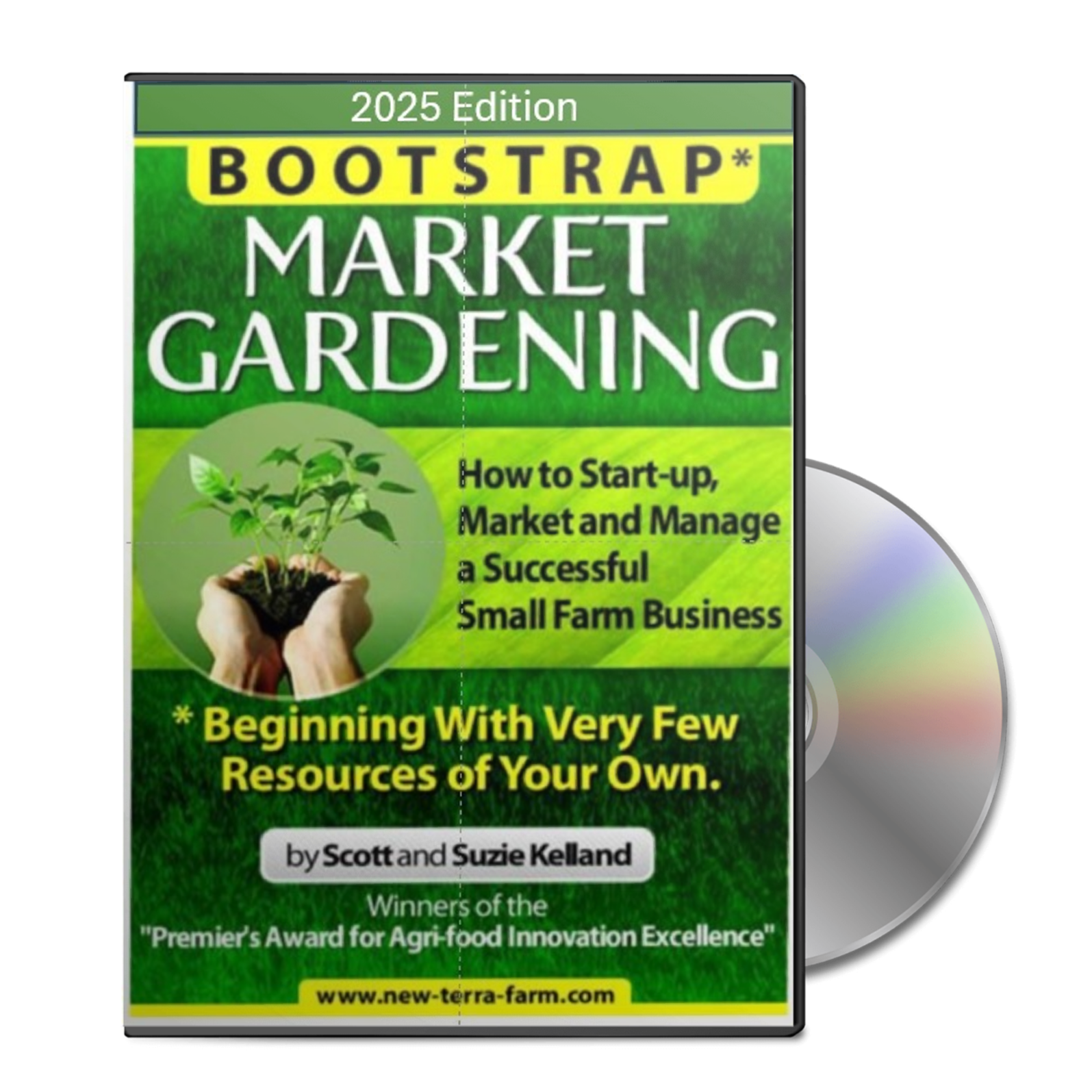 Now includes Garden Planner software Now includes Garden Planner softwareBootstrap Market Gardening, my
first Bootstrap Book, shows you step-by-step how to start-up, market and
manage an organic market garden based on CSA principles. New edition includes my Garden Planner spreadsheet. Get Bootstrap Market Gardening only from New Terra Farm.
Or get Bootstrap Market Gardening as part of me Complete Start Farming Pack and SAVE over 40%
-
Home Page
›
-
Sustainable Organic Farming
›
-
Learn How to Farm
| 




